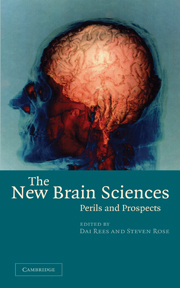Book contents
- Frontmatter
- Contents
- List of contributors
- Part I Introduction: the new brain sciences
- Part II Freedom to change
- 1 Do we ever really act?
- 2 The definition of human nature
- 3 Consciousness and the limits of neurobiology
- 4 Mind metaphors, neurosciences and ethics
- 5 Genetic and generic determinism: a new threat to free will?
- Part III Neuroscience and the law
- Part IV Stewardship of the new brain sciences
- Part V Conclusion
- References
- Index
4 - Mind metaphors, neurosciences and ethics
Published online by Cambridge University Press: 08 August 2009
- Frontmatter
- Contents
- List of contributors
- Part I Introduction: the new brain sciences
- Part II Freedom to change
- 1 Do we ever really act?
- 2 The definition of human nature
- 3 Consciousness and the limits of neurobiology
- 4 Mind metaphors, neurosciences and ethics
- 5 Genetic and generic determinism: a new threat to free will?
- Part III Neuroscience and the law
- Part IV Stewardship of the new brain sciences
- Part V Conclusion
- References
- Index
Summary
Unravelling the mysteries of the mind is perceived to be one of the greatest challenges of the twenty-first century. The development of new biomedical and computational technologies and their application in brain research, which was accelerated during the 1990s by the US ‘Decade of the Brain’ initiative, led to an exponential increase of methods and possibilities to examine, analyse and represent the central nervous system and its workings on many different levels. These developments foster the vision that one day it may be possible to explain psychological and cognitive phenomena as the causal effects of brain chemistry.
At least for some neuroscientists such as the Nobel prize winner Eric Kandel, it is the declared goal to explore all classical philosophical and psychological questions related to cognitive functioning with the methods and concepts of cellular biology. Other researchers think that one day it may even be possible to locate the origin of religious feelings and spirituality in the structures of the brain. According to sociobiologist Edward O. Wilson, the final goal of scientific naturalism will be reached if neurosciences succeed in explaining traditional religion as a material phenomenon. Wolf Singer, a leading neurophysiologist, claims that in the light of the new neuroscientific insights we have to say goodbye to our traditional understanding of human freedom. Even if only parts of such far-reaching claims are realistic, it can be anticipated that the advancement of modern neurosciences will not only change current beliefs about fundamental phenomena of the mind, but our conception of humans in general.
- Type
- Chapter
- Information
- The New Brain SciencesPerils and Prospects, pp. 71 - 87Publisher: Cambridge University PressPrint publication year: 2004
- 2
- Cited by



